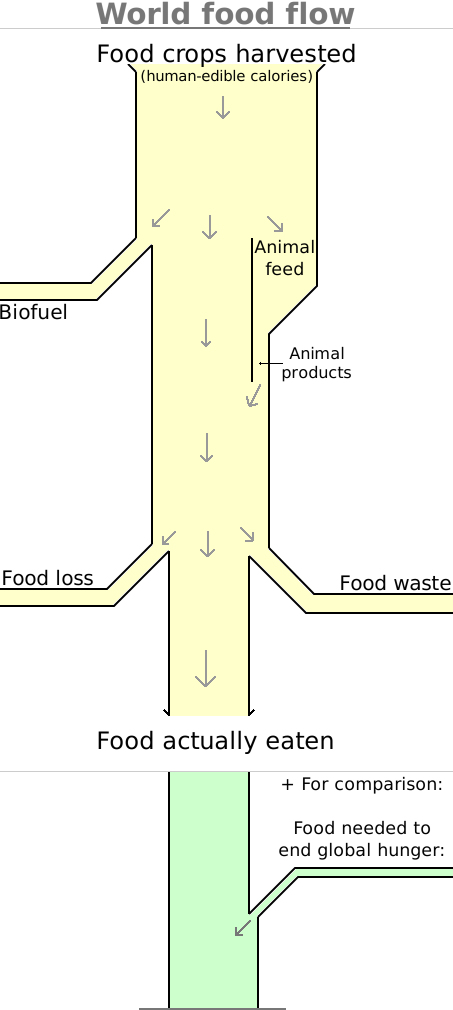Food
The world currently struggles to feed everyone sustainably. But this doesn't have to be the case. There are enough resources to feed our growing population - if resources are used efficiently & ethically.
Problems
Current food-related problems include:
- Hunger & malnutrition
- About 829 million people lack calories or protein (1 in 10 people worldwide).
- Even more people lack vitamins & minerals, even if they get enough calories & protein.
- Environmental impact
- Habitat loss, due to agriculture using so much land.
- Methane emissions, such as from cows.
- CO2 emissions from fertilizer production.
- Pollution from pesticides and fertilizers.
- Animal cruelty
- Particularly bad in factory farms, which are the source of most animal products.
- These problems are amplified by inefficiency:
Read the exact numbers here.
Solutions
Efficiency
Even without any fundamental changes to food production, we can still end hunger and habitat loss by reducing any of the inefficiencies in the diagram above.
What this means in practice:
- Making food more plant-based - reducing animal consumption to its sustainable limit
- Reducing food waste - especially in richer countries
- Reducing food loss - especially in poorer countries
- Not using crops as biofuel - except for the parts that can't be eaten.
These actions require both personal changes and systemic changes.
Farming practices
Anything that increases crop yields will also help end hunger and habitat loss, in the same way as above.
However, it's possible that some "conventional" farming practices might only improve yields in the short-term, and actually destroy the soil & local ecosystems, ruining yields in the long term.
Things this page needs more information on:
- Just how bad are current farming practices, in terms of long-term yields?
- Would switching from monoculture to polyculture improve total yields
(...)( could be measured by calories, protein, or dry mass ) while needing less pesticide? If so, is there a tradeoff? Perhaps an increase in labor - if so, by how much? - Regenerative agriculture: could its yields be as high as current farming practices?
- Suburban farming & gardening: Best case, how much of the world's food could it produce?
- How much fertilizer is fundamentally needed, to achieve high crop yields on a global scale?
Join the discussion and help build this page!
Techy solutions
Things that might be viable at some point in the future:
Things that aren't much better than the status quo:
- Insect farming - the food efficiency is still not any better than plant-based. If insects are fed food waste, it still begs the question as to why that food was wasted in the first place.
Things that probably won't ever be viable:
- Vertical farming - needs too much energy - thus could never supply the world's calories or protein; best case, could provide a few fresh herbs in the city.
- Solein - needs too many materials (per unit of food production) - and it's unlikely for this to be solved enough in the future.
Bottom line
All 8 billion people could be well-fed & healthy, without destroying the planet, and without anywhere near as much harm to animals. But all of this requires both personal changes and systemic changes.
